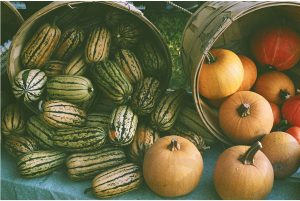Good Food: A Human Right For All
John Jemison
Extension Professor, University of Maine Cooperative Extension

This past spring, as I plunged my shovel into the dark cool soil, I reflected on the many seasons during which a diverse group of volunteers and I grew and delivered vegetables for low-income seniors. When I started my job at Cooperative Extension, I would never have imagined a project like the Orono Community Garden would become such an important part of my work. After completing my PhD in agronomy, I came to Maine to help farm families improve production, increase farm profitability, and reduce agriculture’s impact on the environment. I honestly didn’t understand much about the work of my Extension colleagues in social science areas like Community Development. But, after fourteen years of growing food with volunteers, the Orono Community Garden Project seems to be more about community development than applied science.
“In my first month at the University of Perugia, a colleague asked me to have lunch at his home with his family. Initially I said no because I had to work. He seemed surprised and said “John … we should work to live … not live to work.” ”
I was inspired to create the Orono Giving Garden during my five-month sabbatical leave to Perugia, Italy in 2003. Prior to this, my approach to food would have been described as typically American. Food was a necessity, and purchases were made based on cost, ease, and time. While dinner could have been a highlight of the day, all too often it was just something my wife and I did — something we had to do — in the routine of the day. Acculturating myself to Italian culinary traditions and practices took some time. For the Italians I met, family meals were special and important. In my first month at the University of Perugia, a colleague asked me to have lunch at his home with his family. Initially I said no because I had to work. He seemed surprised and said “John … we should work to live … not live to work.” My Italian education was just beginning, but the difference was clear.
Two small food markets, a butcher shop, bakery, two excellent restaurants, and a bar comprised the food and entertainment scene of the small hilltop town of Panicale where I lived. Each night, after riding the bus from Perugia back to Panicale, I would walk through town and visit both food markets. Yolanda, who sold fresh fruits and vegetables that she and her husband grew, would meet me with “ciao Ghiani … di mi”, roughly translated “hi John, tell me what you need”. Linda, the other market owner, would also greet me by name and ask me about my day. My bond with Panicale locals and good food began to grow. On warm Sunday afternoons, I would walk the narrow winding hill town streets, take in the aromas of Sunday lunch, and listen to the laughter and animated conversations of families around the table. I learned that food and family were fundamental to Italian culture, and sharing opportunities to dine with our new-found Italian friends and learning about their food traditions, changed forever my approach to food. After eating my way through an Italian summer, enjoying deliciously simple food made from fresh ingredients, I began to see food as a glue to bind family, community, and tradition.
“Dinner guests were surprised and amused when I told them they were eating Mark’s spinach or Hannah’s pork. Knowing that I was supporting the local economy became a principle that drove food purchase decisions, not the price or the amount of meat in the frozen chicken package.”
After returning to Maine, I began to localize my food world. I tossed my expired Sam’s card. The Orono Farmers’ Market replaced Yolanda as my source for fruits and vegetables. Dinner guests were surprised and amused when I told them they were eating Mark’s spinach or Hannah’s pork. Knowing that I was supporting the local economy became a principle that drove food purchase decisions, not the price or the amount of meat in the frozen chicken package. But, I found myself thinking, “Why should the economically privileged have access to good, healthy food while those less fortunate went without?” I knew access to quality food was problematic for many, particularly seniors living on fixed incomes. Perhaps, with some work and a little luck, a solution could be found.
The Orono Giving Garden idea was born. I would ask the town for access to some land and water. We would start a garden, grow food, and deliver it weekly to low-income seniors living nearby. Volunteers would be the glue to hold the project together. I would teach them how to grow organic vegetables, and then we would give away the produce we grew. I talked to our town officials, Cooperative Extension administrators, and friends. The response I heard was generally, “Great idea, and good luck with that.” I cultivated interest in the project with sign-up sheets in the senior housing developments. Forty people signed up for food in the first season. Clearly, there was a need for the food. But how much could we grow?
With the help of many volunteers, we’ve produced and delivered thousands of pounds of healthy, quality food to seniors in need each year. With financial support from sources like the Church of Universal Fellowship, the Orono Thrift Shop, and Maine Community Foundation, we have grown and delivered more than 20 different types vegetables. We also provide tasty, easy-to-make recipes for the foods delivered each day. Other educational and outreach projects have developed from this project as well.
“For me, success is getting a warm hug from Alice after a long winter or having Maybelle and her dog Buddy waiting in her yard swing for a quick chat on a warm summer night.”
Although I couldn’t bring Panicale to Orono, we are building community around quality food. Volunteers who return year after year to sustain our program do so because they feel connected. For me, success is getting a warm hug from Alice after a long winter or having Maybelle and her dog Buddy waiting in her yard swing for a quick chat on a warm summer night. Watching seniors sitting together at a picnic table, waiting to trade vegetables and give you tips on your recipes, feels more like building community than reducing food insecurity.
Doing this work, I’ve learned a lot about the aging process. I’ve watched many seniors lose their independence. Some have been force to move in with their children. Others have had to move to assisted living or long-term care. Many have passed away. While aging can be isolating, food seems to promote social interaction. Its special to work with volunteers who care that seniors aren’t hungry or lonely, who want to give, who want to connect with the earth, and who want to grow, harvest, and share good food. When the days shorten and winter’s cold settles in, its comforting to remember the smell of the earth, our conversations and laughter, and sharing melons in the warm sunshine.
I too am feeling the passing of time. When we started this garden, I had brown hair and lots of energy. Today, as I push 60, I have less hair, it’s not very brown, and my back and joints are creaky and cranky. Why do I continue doing this year after year? I need to. Quality food should be a right, not a privilege. Its fundamental to a healthy, sustainable society. But, quality food takes time to grow and time to prepare. Connecting people to the cycles of the earth, and teaching them to smell the aroma of freshly turned earth after a long Maine winter are gifts I want to share. I’ve seen fourteen seasons come and go at the Orono Giving Garden. I hope that I won’t see fourteen more seasons at the Orono Giving Garden, but I hope at least a few more are possible. If the garden continues after that, I will know we’ve built something special and developed real community in our town.

